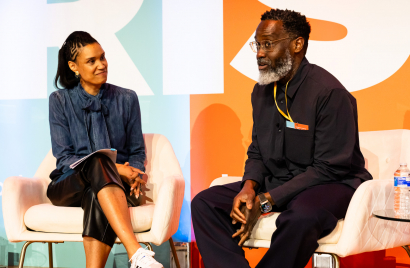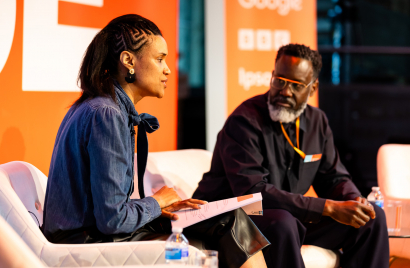
‘I want to create an inclusive space for the excluded girl’
At Advertising Week Europe, Visha Kudhail and Irene Agbontaen celebrated the launch of season 2 of the ‘Behind The Face of Success’ podcast .

Speaking at the Creative Equals Rise conference, Ije Nwokorie, Chief Brand Officer at Dr Martens urged marketers to adopt a product-led mindset

Are you marketing to consumers, or are you creating for them?
That was the question sparked by Ije Nwokorie, Chief Brand Officer at Dr Martens, in an expansive and thought provoking conversation with Debbie Tembo, Inclusion Partner at Creative Equals.
Speaking at the Creative Equals Rise conference, Nwokorie explained that the principles of marketing are largely military. “You pick an audience, you adopt a strategy and you run a campaign,” he explained. In contrast, the language of creating a product is completely different. As he shared, a product focus starts with ‘making something that will delight you’, in contrast to the ‘us vs. them’ attack strategy of traditional marketing.
“When you are creating a product, you are creating for people and it’s a different approach to marketing,” he explained.
Pointing to generic brands, he shared that the brand becomes the thing you need to differentiate. In contrast, when you are making something unique, why would you need to talk about something else? “Apple knows that really well, you won’t see an advert about why Apple is such a great company, it is all about talking about the product,” he added.
He continued: “If the marketing strategy is about talking about the product you have to make sure the product is brilliant.” Sharing that his focus is on: “stripping away everything that gets in the way of the customer discovering our product.” He warned: “Sometimes marketing can get in the way, with so much focus on trends.”
The notion that we are all born creative is what has driven my career.
Ije Nwokorie, Chief Brand Officer at Dr Martens
Nwokorie, who is poised to step up to the role of CEO at Dr Martens, joined the company 3 months ago as Chief Brand Officer.
Dr Martens, a brand famous for its iconic boot, is a 79-year-old brand steeped in craft and culture. The first ever pair of its trademark boots were created in 1945 by Klaus Maertens, a Bavarian soldier who needed to support an injured foot. The boot became a symbol of British youth culture and the working class.
Nwokorie shared that the brand was founded in a non-conformist attitude. “There is a radical utilitarianism [to the boots]. It has always been adopted by those who didn’t want to conform.”
He continued: “Everyone has moments where they don’t fit in, this is a brand that celebrates you for not fitting in.”
Dr Martens is a brand that is synonymous with culture. From being adopted by the punk movement, to the grunge movement, its trademark boots have thrived across decades of fashion cycles.
Yet Nwokorie is clear that the brand is not defined by how people choose to wear it. “We create a brand that doesn’t want to keep up with the trends,” he explained. He noted that the brand would have ceased to exist if it had defined itself as a punk brand. “Our job is to craft icons that defy the norms, it is up to wearers what they do with them.”
He continued: “The minute you move away from what you do and take credit for what a consumer does you become inauthentic.”
The minute you move away from what you do and take credit for what a consumer does you become inauthentic.
Ije Nwokorie, Chief Brand Officer at Dr Martens
“The notion that we are all born creative is what has driven my career,” shared Nwokorie. With a career that has spanned Wolff Olins, Apple and Dr Martens, Nwokorie has both the business credentials and the core belief that creativity is for everyone.
His creative philosophy is rooted in the Igbo word ‘akon’uche’. A word which represents a more inclusive and elastic lens to consider creativity when compared with traditional Western definitions that have historically suggested that creativity is something you either have you don’t. In contrast, akon’uche refers to the innate human ability and capacity to think and make. In essence, it is a word that powerfully underlines that creativity is for everyone.
Nwokorie was born in the US to a Nigerian university lecturer father, who in 1966 moved his family to the US following the civil war in his homeland. A few years later the family returned to Nigeria where Nwokorie grew up. It is an experience that has shaped both his creative outlook and sense of self.
“If you grew up in a post-war military dictatorship office politics is nothing,” he quipped, adding: “My background and where I have come from is my superpower.”
We look back to our archive, but not with nostalgia but always with a drive to move forward.
Ije Nwokorie, Chief Brand Officer at Dr Martens
Nwokorie shared his view that diversity is crucial to success. “Dr Martens is the most diverse organisation I have ever worked in. That is a superpower. But that also comes with tasks for leaders.”
He continued: “Leadership works hard to ensure that every voice counts. If they celebrate rebellious self-expression in their customers, they also have to celebrate it in their employees too.”
He shared that when new people come into a brand they bring with them different ideas. The challenge for leaders is to answer the question: ‘How are you going to take this team on a journey?”
For Nwokorie the answer to this tension is to be intentional in creating a space where everyone can be heard, as well as ensuring the entire team is focused on ‘crafting icons and defying norms’. A pursuit which demands not leaning on the brand’s heritage as a comfort blanket of nostalgia. “We look back to our archive, not with nostalgia but always with a drive to move forward,” he explained.
“The behaviour you have to make is all about moving forward,” he shared. This means knowing what is happening across the globe, but not being led by trends, or perturbed by headlines on the brand’s IPO.
As Nwokorie’s clarity of thinking underlines, leading a brand that will outlive you demands constantly looking forward, rather than looking to the past for a blueprint to the future. As Lin-Manuel Miranda’s Hamilton asks: “What is a legacy? It's planting seeds in a garden you never get to see.”
Yet with his focus on removing silos and marrying shared purpose with sustainability and creating a space where everyone has a voice, those green shoots of recovery and constant reinvention are assured. One boot-clad foot in front of the other.
To learn more, sign up to receive our free RISE Trend Report here.


Photo credit: Bronac McNeill
Looks like you need to create a Creativebrief account to perform this action.
Create account Sign inLooks like you need to create a Creativebrief account to perform this action.
Create account Sign in